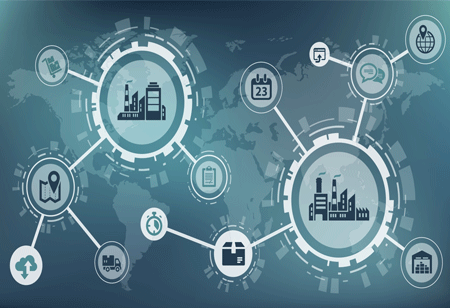THANK YOU FOR SUBSCRIBING
Blockchain-IoT Duo is Revamping Supply Chain!
The integration of IoT and blockchain can disrupt the traditional supply chain with the incorporation of a transparent, decentralized smart contract ecosystem.

By
Apac CIOOutlook | Tuesday, July 02, 2019
Stay ahead of the industry with exclusive feature stories on the top companies, expert insights and the latest news delivered straight to your inbox. Subscribe today.
The integration of IoT and blockchain can disrupt the traditional supply chain with the incorporation of a transparent, decentralized smart contract ecosystem.
FREMONT, CA: Blockchain technology in integration with the internet of things (IoT) has the potential to disrupt several industries. The integration of IoT and blockchain is disrupting the traditional supply chain with the incorporation of a transparent, decentralized smart contract ecosystem. IoT devices that include an array of devices connected to the network can be used to collect telemetry data at various stages of a supply chain. The data thus collected is transferred to an IoT hub that aggregates the data streams for further analysis. Blockchain smart contracts perform validation on the data and update each supply chain stage for various parties. Rule-based intelligence can be used to enable the transactions in a completely transparent and trusted manner.
Check out: Top Supply chain companies
The above concept can be understood with an example from the dairy industry’s distribution supply chain. The chain initiates where milk is sealed at a set temperature and humidity level. The transportation process requires the same condition. IoT devices with sensors for humidity and temperature can be installed in the carriers. All the partners in the supply chain can track quality status, delivery time, and costs. Thus smart devices integrated with blockchain will reduce the operating costs and increase the efficiency of the supply chain.
The primary goal of blockchain technology was to ensure trusted financial transaction between two entities without involving a third party such as a bank. Peer-to-peer transaction meant less expensive and faster transactions. The immutable and secure nature of the blockchain provides complete integrity as the transactions are validated within the system.
Additionally, blockchain transactions are stored and distributed across several nodes within the network. Thus the technology allows creating and maintaining a common and updated database. The concept of “smart contracts” has emerged due to the above factors. It is to digitally facilitate, negotiate, or verify an agreement between two parties. Smart contracts allow legitimate transactions without the requirement of a central authority. Moreover, the transactions can be tracked and are irreversible.
Some supply chain companies: 1WorldSync, AFFLINK, Matthews International dba Pyramid





